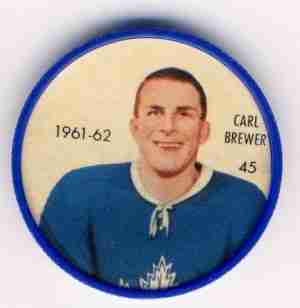230. Tomas Kaberle
A four time All-Star, Tomas Kaberle is the second all-time leading scorer among Toronto Maple Leaf Defensemen, which is no small feat considering we are talking about an Original Six Team.
67. Rick Vaive
Regardless of the era, scoring 50 goals in three consecutive seasons is an impressive statistic. Even though it was the wide-open early 80’s that saw Rick Vaive accomplish that feat, remember he did so for a brutal Harold Ballard organization that saw the worst of the Toronto Maple Leafs. Vaive had a killer slapshot and used that skill to net 441 career goals. Because Vaive played with so many bad teams, his career is often forgotten, but he was often to only bright light on many teams in the 1980s.
41. Paul Henderson
With 477 career NHL points (and 283 in the WHA), the professional statistics speak to a very good player but not that of the Hall of Famer. This is very much the consensus of most hockey pundits and fans alike. However, we all know of that intangible of the 1972 Canada/Soviet Union Summit Series. Coming off his most productive NHL year with 38 goals, Henderson was an afterthought selection to team Canada. Henderson responded with the best hockey of his career leading the tournament with ten points. Of course, it was that final point, a goal with thirty four seconds remaining that he will known forever for. That goal won the series and made him an icon in Canada. It is a moment that is played over and over again on Canadian television, and will be replayed for generations to come. When critics say that Paul Henderson would not be in the Hall of Fame discussion if he hadn’t scored “the goal” but what they have to remember is one thing: HE DID score that goal.
76. Eddie Shack
He may not be on this list for his career statistics, which although were good (465 career points over 17 years) to do not indicate a Hall of Famer, but Eddie Shack was one of the true characters of the game and at times the most popular. Shack could always be counted to deliver a unique interview and perspective that was different from his contemporaries. Shack was even the subject a novelty song (Clear the Track, Here Comes Eddie Shack) that went to number one in the Canadian charts. Shack was to many a “novelty” player himself but anyone who can last as long as he did is certainly no gimmick.
25. Curtis Joseph
19. Lorne Chabot
Although the bulk of the early era players are in the Hockey Hall of Fame, a case could be made for the talented Lorne Chabot. The Montreal native was successful everywhere he went, posting winning records and winning two Stanley Cups. Chabot’s career saw him get 201 over eleven seasons but as he played with six different teams he got labeled a journeyman despite the successful performances he showed.
65. Wendel Clark
If the rabid fan base in Toronto had anything to say about it, the hard hitting Wendel Clark would have skated into the Hockey Hall of Fame on the first ballot. Clark was the bright spot on dismal Leaf teams, and his gritty take no prisoners style of play made him one of the most popular (if not the most popular) Leaf of all time. He wasn’t the largest player on the ice, but he may have been one of the toughest of his era. In addition, Clark was able to produce decent offensive numbers as he netted 30 goals a season on four occasions. If the Hall put players in just on heart alone, Wendel Clark would be a lock but as such he probably doesn’t have the career stats to get in.
106. Sid Smith
From the Original Six, Sid Smith was a consistent star for the Toronto Maple Leafs in the 50’s. Smith was a solid 20 goal scorer (a big deal for that era) but it always seemed that whenever Smith would put the puck in the net it would be in pivotal situations. Although he was a clutch goal scorer his gentlemanly play, which while respected, did not exactly make him stand out. Had he been able to do so, the multiple times All Star would have had a much better shot for induction.
59. Vincent Damphousse
You have to think that if you were a kid growing up in Montreal your hockey related dreams might involve winning a Stanley Cup for your beloved Habs. If this was the case for Vincent Damphousse than Mission Accomplished! Damphousse hoisted the Stanley Cup as a first-line centre for his home town Montreal Canadians in 1986.
24. Carl Brewer
If ever there was a hockey player who marched to his own tune, it would have to be Carl Brewer. A brilliant stay at home defenseman, Brewer would literally do whatever it took to stop any attacker. He was also the victim of rash decision making as his uncontrollable intensity often cost his team costly penalties. Brewer also left the game on multiple occasions (even during the peak of his career) due to off ice disagreements with other players, coaches, or management. Had Brewer stayed in the NHL consistently, his hockey accomplishment would be unquestionably larger but as such he will go down in history far more for his off ice activities than on.











